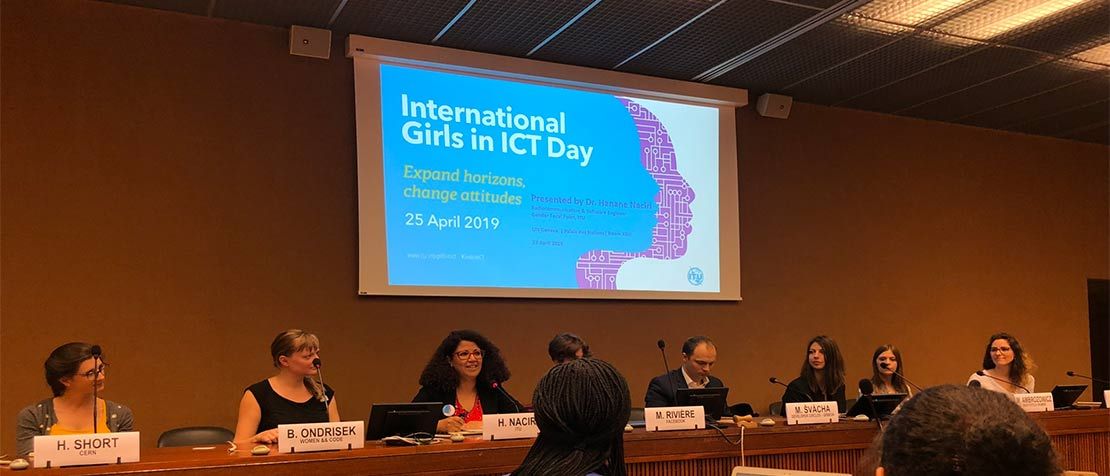
How can we close the digital gender gap? 4 key questions answered.
To celebrate ITU’s International Girls in ICT Day, the United Nations Office of Geneva and Developer Circles from Facebook Geneva joined ITU to explore what practical actions can be taken to empower women and girls in the field of information and communication technology (ICT).
Eight distinguished ICT experts shared their success stories and avenues for action at the Palais des Nations on Tuesday.
The advice centred on four key questions:
- What can men do to make the tech world better for women?
- What could women in the ICT sector do?
- How can tech companies make a change?
- And what is the role of educators and parents?

Here are some key insights from the session, Closing the Gender Gap in the Digital World.
1) How can men help make the tech sector a better place for women?
Michal Švácha, a Senior Software Engineer from Developer Circles Facebook, discussed his experience being in a university programme composed of “nearly 98% men” and how he felt knowing that a large percentage of women were being left out.
“Most technologies are developed by men, for men.” — Morgan Rivière, Facebook.
He posed a question to each of the panelists: “What is one thing that men can do to help close the gap and make the tech world better for women?”
Their answers provided actionable and thoughtful ways to address the inequalities that currently exist.
“When you are designing software, you design it in a certain way,” said Morgan Rivière, a Research Engineer working on Artificial Intelligence at Facebook. “Most technologies are developed by men, for men. The situation is getting better. But there is a lot of room for improvement.”
“Reflect on your own bias, and your own gender roles,” advised Dr. Barbara Ondrisek, a software developer and co-founder of Women And Code, a non-profit JavaScript learning group for women in Vienna, Austria. To overcome bias she suggested that men should “read books and watch films created by women” and learn more about the contributions to the ICT field of women such as Grace Hopper, Evelyn Berezin and current leading women in tech like Susan Wojcicki.
Breaking down gender roles and sharing the load of childcare duties is another way to address imbalance, agreed the experts.
“Maybe men can take the lead to pick up the children from school. So when men and women are being hired, the employers will think that it’s the same,” said Natacha Gajdoczki, General Secretary of Women in Digital Switzerland.
2) What can women in the tech sector do to make it more equal?
“We need that women have access to ICTs, that they are empowered with skills to become an entrepreneur and to have a chance to lead,” said Dr. Hanane Naciri, Radiocommunication Engineer at ITU. She discussed how mentoring networks are making a difference in the tech world and how events such as Girls in ICT Day are impacting the lives of thousands of girls around the world.
“When you can see it, you can be it. Hands-on experience and role models matter!” — Hanane Naciri, ITU
The Network of Women at World Radiocommunication Conference 2019 (NOW4WRC19) is a professional network that prepares women for leadership roles in the technical world of radiocommunications. “This is an example of ‘women at the table.’ We want to hear their voice,” said Dr. Naciri.
RELATED: Women spurring innovations in Radiocommunications
She discussed the power of International Girls in ICT Day, the UN-recognized day to inspire young girls to consider careers in technology. To date, over 357,000 girls and young women have already taken part in more than 11 100 celebrations of International Girls in ICT Day in 171 countries worldwide.
“When you can see it, you can be it. When [girls] see women in the ICT sector and when they learn from them, this is very important,” said Dr. Naciri. “Hands-on experience and role models matter!”

Mentorship, and more importantly, sponsorship, are great ways to help women take on leadership roles in their field. Flora Barriele, from Geek Girls Carrots, highlighted the need to lift up and acknowledge outstanding women.
“Whatever your career is, please have in mind a women you know and sponsor her,” said Barriele. “It’s more than just mentoring. It’s about reaching out to people you know and saying: I know this woman doing an amazing job, you should consider her for a job or promotion.”
3) How can tech companies and conferences make a change?
The experts assembled agreed that there is a need to understand the barriers that prevent women from participating as speakers on panels or attending tech conferences.
Watch the video to learn more:
Natacha Gajdoczki from Women in Digital Switzerland discussed the lack of childcare options in many places. She noted that the open nature of their meetup events provided a friendly and safe space that supports women.
“You can bring your baby if you cannot find a baby sitter. You can even bring your dog,” she explained.
4) What is the role of educators and parents?
Starting early is key, said Hannah Short, from CERN’s Women in Tech (WiT) community. She spoke of an imbalance between young children who have been exposed to technology at an early age, and those who have not.
Teachers and parents are the ones who can inspire change, she said.
“Combat stereotypes at every level. It’s not just about tech toys for girls. It would be great to see more balance in every level,” says Short.
Dr. Ondrisek agreed. “Expose children to non-gendered toys and literature,” she advised.
“Find girls in your family and ask them if they have considered a job in ICT!” Dr. Hanane Naciri said.

Photos courtesy of Adam Kane, UNOG
